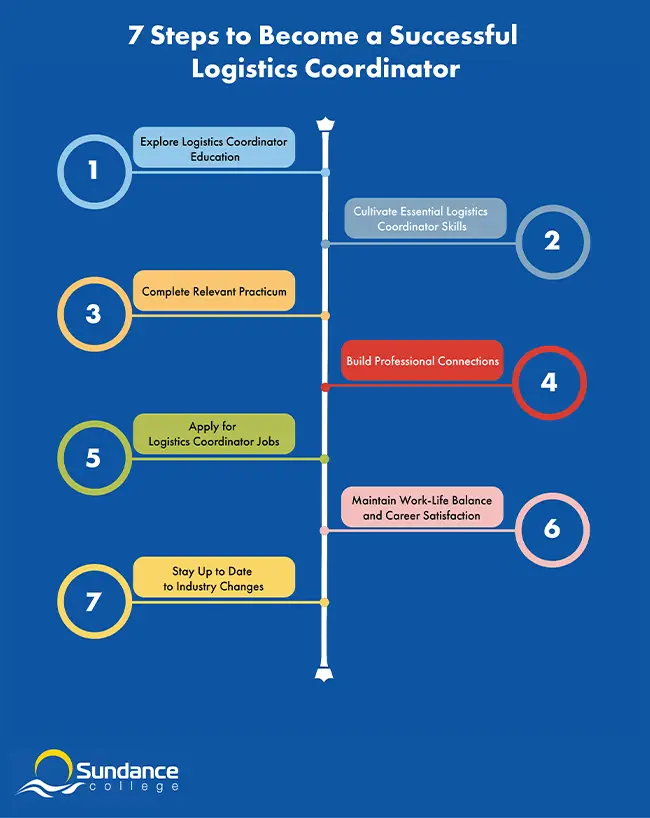Blog / Logistics Coordinator 101: Your Comprehensive Guide to Launch a Supply Chain Career
Logistics Coordinator 101: Your Comprehensive Guide to Launch a Supply Chain Career

Supply Chain Management Professional Diploma
- Supply Chain Management
- Shipping Coordinator
- Purchasing Agent
- Warehouse Supervisor
Table of Contents
On Thursday, at 11:15 a.m., as Alex reviewed the day’s shipment schedule, an urgent call came in from the production team. The shipment of conveyor belts, essential for an assembly line, was delayed due to unforeseen weather conditions in Regina.
In seconds, Alex contacted Kris, an alternate supplier of conveyor belts from Saskatoon, and arranged for an emergency shipment. Then, Alex asked the warehouse team to make that order a priority and rearrange the loading schedule.
In about an hour, Jake from InterFulfillment Inc., a distribution company, informed Alex that there might be a delay in a shipment of phone pouches destined for an international youth dance festival in Toronto. Together, Alex and Jake quickly identified the alternative routing option for timely delivery, and Alex reflected it in the transportation management system.
At 4:55 p.m. a last-minute order change from a loyal customer Alex had been assigned to for 3 years came in. They needed their 20 cartons of stationery to be delivered to another address. Alex opened the TMS and adjusted the shipment details. Five minutes later, she sent a follow-up email to the customer to keep them informed about the successful updates.
By the end of the day, knowing that all shipments were on track and production was uninterrupted, Alex was filled with pride in a job well done.
This is what it means to be a Logistics Coordinator: not just fulfilling orders, but embracing challenges, going the extra mile, and caring for customers’ trust.
Picturing yourself in Alex’s role? Thinking of a career in supply chain management?
If so, explore our comprehensive guide to learn the logistics coordinator responsibilities, the essential skills you need, and the step-by-step process to follow your calling and become a successful professional in this field.
What Does a Coordinator Do in Logistics?
If you asked us to provide the logistics coordinator job description in one sentence, it is: Their main responsibility is to collaborate with customers, manufacturers, and distributors to ensure the products come to the right place, in the right quantity, and at the right time.
During their typical working day, a logistics coordinator can:
- Reply to emails from suppliers, retailers, and customers to achieve profitable deals
- Print orders, create shipping labels, and schedule shipments
- Assist their warehouse team in preparing goods for shipments and transporting them to shipment gates
- Coordinate truck drivers according to availabilities and requirements
- Facilitate seamless loading/unloading of goods, including the help with signing consignor’s certifications to not having any truck driver waiting
- Ensure the maximum allowable load of trucks to not having any vehicle driving half-empty
- Track inventory levels of raw materials and equipment
- Keep logs and records of executed orders, return orders, etc.
- Be adept at using logistics software systems, scanners, and other tools that help them optimize supply chain procedures
- Prepare accurate reports for upper management
What Do You Need to Be Good at Logistics?

You need to be a good multitasker or “task switcher” to excel as a logistics coordinator. You may already be a skilled multi-tasker, and you can also develop into one. What other skills, both hard and soft, do you need to excel in this profession? Let’s find out.
What Are The Most Important Technical Skills Required To Succeed As A Logistics Coordinator?
As a logistics coordinator, you need to ensure the smooth and efficient flow of goods and services throughout the supply chain. In today’s digital world, most supply chain operations are facilitated by technology.
Whichever logistics company you’ll work for, proficiency with some of the following 10 software systems and tools will be your asset:
- Inventory Management Software — to optimize stock levels and avoid stockouts or overstock situations
- Transportation Management Systems — to plan and optimize transportation routes, select carriers, track shipments, and effectively manage freight costs
- Supply Chain Analytics Tools — to identify trends, assess performance metrics, and make informed decisions to enhance overall efficiency
- Customs and Trade Compliance — to ensure seamless cross-border transactions and avoid costly compliance issues
- Geographic Information Systems — to optimize route planning, reduce delivery times, and enhance overall supply chain efficiency
- Warehouse Management Systems — to streamline processes like order picking, packing, and inventory tracking, leading to improved warehouse productivity
- Material Handling Equipment Operation — to efficiently load and unload goods, organize the warehouse, and ensure workplace safety
- Order Management Systems — to facilitate order tracking, order fulfillment, and timely delivery to meet customer expectations
- Packaging and Labeling Standards — to ensure that goods are properly packaged for safe transportation and that they comply with shipping regulations
- Technology Adaptability — to be adaptable to new technological advancements in supply chain, such as automation, Internet of Things (IoT) devices, and Artificial Intelligence (AI)
What Are Soft Skills For A Supply Chain Coordinator?
Beyond technical expertise, the supply chain coordinator role demands a diverse set of soft skills to navigate the dynamic environment of the supply chain ecosystem.
Let’s explore the 10 key logistics coordinator soft skills good to have on your resume:
- Effective Communication: Clear and concise communication will help you foster strong working relationships with suppliers, team members, and customers and provide smooth coordination across the supply chain.
- Problem-Solving Aptitude: As a logistics coordinator, you will have to analyze complex situations and find effective solutions on the fly. Your ability to think critically, make quick decisions, and resolve challenges promptly will set you apart from other candidates in the eyes of the potential employer.
- Time Management: Prioritizing tasks, adhering to deadlines, and optimizing schedules are crucial for meeting customer expectations and ensuring timely delivery. To become a seasoned supply chain coordinator, you need to have excellent time management skills.
- Adaptability and Flexibility: Being adaptable and flexible in the face of unexpected challenges enables you as a logistics coordinator to adjust plans swiftly and maintain operations without compromising efficiency.
- Team Collaboration: As a logistics coordinator, you will work with diverse teams, including suppliers, carriers, warehouse staff, and more. In this position, it’s vital to know how to effectively collaborate and build positive working relationships.
- Customer Service Orientation: Logistics coordinators often serve as the primary point of contact for customers. Demonstrating a customer-centric approach and prioritizing customer satisfaction, you’ll foster loyalty and trust, enhancing the overall reputation of the supply chain company you’ll work for.
- Stress Management: The logistics industry can be under high pressure, especially during peak seasons or when dealing with unexpected challenges. The ability to manage stress and remain composed under pressure will help you make sound decisions and maintain focus on problem resolution.
- Attention to Detail: The logistics process involves numerous components, from tracking inventory to managing documentation. Attention to detail will help you be accurate in every aspect of logistics coordination, reducing the risk of errors and delays.
- Leadership Skills: As a logistics coordinator, you may oversee a team or collaborate with colleagues on complex projects. Possessing leadership skills allows you to inspire and motivate team members, promoting a positive and productive work environment.
- Conflict Resolution: The ability to handle conflicts diplomatically is vital in logistics coordination, where different stakeholders may have varying interests. Being skilled in conflict resolution will help you find win-win solutions.
Syed, our Supply Chain Management instructor highlights one more, no less important, skill to succeed in a logistics coordinator role:
“There are lots of crucial skills for logistics coordinators: time management, team collaboration, attention to detail, and more. But what will really make you a high-end professional in this field is your positive attitude that you want to help your partners achieve their key targets in the procurement/delivery of goods and services in a timely manner.”
A well-rounded skill set, encompassing both technical and soft skills, will set you on the path to becoming a successful logistics professional.
How can you gain the necessary knowledge and solid skills to get hired as a logistics coordinator? The answer lies in getting proper supply chain management education.
7 Steps to Become a Successful Logistics Coordinator

Whether you’re a recent high-school graduate, a temporary foreign worker seeking a promising job opportunity, or a full-time employee looking for a career change, these seven steps will guide you through how to become a logistics coordinator and gain a foothold in this profession:
Step 1: Explore Logistics Coordinator Education
Begin your journey by researching different educational paths to become a logistics coordinator. Look for reputable post-secondary career colleges that offer supply chain management diploma programs.
There are two main reasons why you should choose among career colleges: 1) their learning programs are fast-tracked, so you’ll become job-ready in around a year; 2) many of them offer several weeks of practicum placement, so you’ll be able to apply immediately the theory, knowledge, and skills you’ve acquired and get relevant experience to prove yourself to a potential employer.
Read our article to learn more about the benefits of a career college for a successful career change
Step 2. Cultivate Essential Logistics Coordinator Skills
During your studies at a career college, focus on developing the above-described skills for logistics coordinators. Remember that learning goes beyond acquiring knowledge; it involves receiving and analyzing feedback on your progress.
To develop, improve, and keep your essential skills for the future profession sharp and up-to-date, you need to constantly analyze feedback from your instructors and classmates and make appropriate adjustments to your training.
Step 3: Complete Relevant Practicum
If you make the right career college choice, you’ll be enrolled in a specialized practicum closer to graduation. A well-structured program will provide you with practical exposure to real-life logistics challenges and build your industry-specific knowledge.
Moreover, practicing management of different logistics scenarios during your practicum placement will help you build confidence — having which can make all the difference at job interviews.
Step 4: Build Professional Connections
Networking is a crucial aspect of any successful career. Attend industry events, join supply chain management forums, and connect with professionals in the field. Building a strong professional network can open doors to job opportunities and provide valuable insights into the logistics industry, as well as the entire supply chain management ecosystem.
Step 5: Apply For Logistics Coordinator Jobs
With the right education, skills, and connections, start applying for Logistics Coordinator positions. Again, with the right career college choice, you won’t have to do all job searching preparations alone — your college will offer you its career support services.
Their career service specialists will assist you in tailoring your resume to highlight your relevant experiences and showcase how you can add value to potential employers. They will provide mock interviews with you where you can practice common logistics scenarios and demonstrate your problem-solving abilities in the most favorable light.
Thus, when sitting in front of an HR manager at a real interview, you’ll be fully prepared for what to say and how to say without crumbling in fear.
Step 6: Maintain Work-Life Balance And Career Satisfaction
Balancing work and personal life is essential for long-run success and well-being. As a Logistics Coordinator, you may encounter high-pressure situations, so focus on self-care and stress management. A healthy work-life balance contributes to a more fulfilling career journey.
Step 7: Stay Up To Date To Industry Changes
The logistics industry is constantly evolving with advancements in technology and changing market dynamics. Keep your finger on the pulse of the latest logistics industry trends, regulations, and best practices in supply chain management. Remember that continuous learning and logistics career development initiatives always pay off.
Logistics Coordinator Job Outlook with Salaries
The demand for skilled logistics coordinators is on the rise, driven by the growth of e-commerce and globalization. How does high demand affect the salaries of supply chain specialists in Canada? Or more precisely, how much can you, as an entry-level logistics coordinator, earn? And what provinces are ready to pay more for this role?
In Canada, the average base salary for a logistics coordinator is $52,476 per year or just over $25 per hour. Currently, Saskatchewan, Manitoba, and Alberta pay the highest salaries for logistics coordinators’ work.
Unleash Your Potential with Sundance College Supply Chain Management Professional Diploma Program

A career as a Logistics Coordinator offers exciting challenges and opportunities for growth. By following the seven steps outlined in this guide and enrolling in the Sundance College Supply Chain Management Professional Diploma Program, you can embark on a journey in supply chain management.
Sundance College Diploma Program can provide you with the training and knowledge to start working as a logistics coordinator in 60 weeks (about 1 year and 2 months):
- In-depth curriculum with courses that cover supply chain fundamentals, contract law and administration, distribution and transportation, ethical behavior and social responsibility, global transportation and trade, inventory management and forecasting, logistics systems and technology, operations management, sourcing, and purchasing.
- All-round skillset development. The program emphasizes essential software proficiencies to equip you with practical tools and enhance your efficiency in logistics coordination. Networking and negotiation skills, as well as effective business communications, are also included in the program curriculum.
- Experienced instructors who are deeply invested in your success. For example, with 7 years of experience working in the supply chain and logistics field for multiple organizations, our Supply Chain Management instructor, Syed, can help students learn the intricacies of international trade, the nuances of logistics technology, and equip them with the necessary expertise to navigate the complexities of the global supply chain.
- Practical experience and hands-on learning. As you progress through the program, you’ll find yourself well-prepared to tackle real-world logistics challenges, thanks to 7 weeks (about 1 and a half months) of practicum placement. The program’s focus on ethical business practices, social responsibility, and sustainability aligns with the modern demands of the industry, shaping you into an ethical and forward-thinking logistics professional.
- Career services and student-centric support. At Sundance College, student success is at the core of everything we do. To that end, we provide a range of comprehensive supports: Orientation classes, Career Services, 24/7 access to mental health support, technical assistance – as well as a laptop!
And awelcoming and supportive college environment. According to SCMP student, Pierre M., in his Google review:
“Everyone is very helpful. Very good explanation from the very beginning.”
To learn more about studying logistics at Sundance College, get in touch with our admission advisors by filling out this Request Info form. See you soon!
Related Blogs
Subscribe for more career advice
Blog Categories
Share on:
